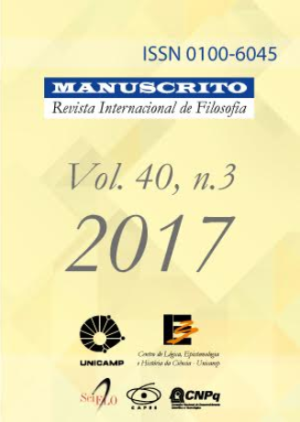Resumen
Moral Naturalism is the view that moral judgments aim at describing moral facts and that these are ordinary garden-variety natural facts. Moral Naturalism has trouble accounting for the intuition that we cannot outsource moral judgments, i.e., we cannot ground a moral conviction that p on the fact that a reliable moral adviser holds that p. There have been, however, several attempts to explain this intuition away or to discredit the intuition pumps that bring it forward. I argue that moral naturalists are not in a position to deny this intuition. Moral Naturalism embodies a conception of the minimal conditions for someone to qualify as capable of making moral judgments; among these conditions is the acknowledgment of the supervenience of the moral on the non-moral; given the naturalist's conception of what it takes for someone to be capable of moral judgment, if we allow agents to outsource their moral judgments we come to situations in which the convictions of moral agents do not comply with the acknowledgment of moral supervenience. The naturalist must, therefore, deny the possibility of moral outsourcing. Moral Naturalism, then, faces the problem of making sense of the ban on moral outsourcing.Citas
BRINK, D. “Moral realism and the sceptical arguments from disagreement and queerness”. Australasian Journal of Philosophy, 62, pp. 111-125, 1984.
BRINK, D. "Realism, Naturalism, and Moral Semantics". Social Philosophy and Policy, 18, pp. 154-176, 2001.
BOYD, R. "How to Be a Moral Realist”. In G. Sayre-McCord (ed) (1988), pp.181-228
COPP, D. "Milk, Honey, and the Good Life on Moral Twin Earth”. Synthese, 124, pp. 113-137, 2000.
COPP, D. Morality in a Natural World. New York: Cambridge University Press, 2007.
COPP, D. "Normative Naturalism and Normative Nihilism". In S. Kirchin (ed) (2017), pp. 28-53.
DRIVER, J. "Autonomy and the asymmetry problem for moral expertise". Philosophical Studies, 128, pp. 619-644, 2006.
HILLS, A. "Moral Testimony and Moral Epistemology" Ethics, 120, pp. 94-127, 2009.
HOPKINS, R. "What is Wrong With Moral Testimony?". Philosophy and Phenomenological Research, 74, pp. 611-634, 2007.
HOWELL, R. “Google Morals, Virtue, and the Asymmetry of Deference”. Noûs, 48, pp. 389-415, 2014.
JACKSON, F. From Metaphysics to Ethics. New York: Oxford University Press, 1998.
JONES, K. "Second-Hand Moral Knowledge”. The Journal of Philosophy, 96, pp. 55-78, 1999.
JONES, K. & SCHROETER, F. “Moral Expertise”. Analyse & Kritik, 34, pp. 217-230, 2012. Kirchin, s. Reading Parfit On What Matters. New York: Routledge, 2017.
MCGRATH, S. "Skepticism about Moral Expertise as a Puzzle for Moral Realism”. Journal of Philosophy, 108, pp. 111-137, 2011.
NICKEL, P. "Moral Testimony and its Authority". Ethical Theory and Moral Practice, 4, pp. 253-266, 2001.
SAYRE-MCCORD, G. "Different Kinds of Kind Terms: A Reply to Sosa and Kim". Philosophical Issues, 8, pp. 313-323, 1997.
SAYRE-MCCORD, G. Essays on Moral Realism. Ithaca: Cornell University Press, 1988
SLIWA, P. "In Defense of Moral Testimony". Philosophical Studies, 158, pp. 175-195, 2012.
SLIWA, P. "Moral Understanding as Knowing Right from Wrong". Ethics, 127, pp. 521-552, 2017.
STURGEON, N. "Moore on Ethical Naturalism". Ethics, 113, pp. 528-556, 2003.

